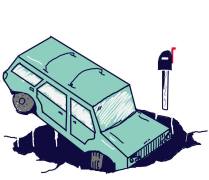By Doc Polk
A work of autobiographical creative non-fiction, contains scenes of war
Image: Untitled (Demi-cône), by Alexander Calder, 1972.
Is it colder than the day before? I don’t see how that’s possible. Thoughts pass through my head like soldiers dragging their feet on a forced march. Maybe the frigid air has been freezing my brain. Maybe the endless cloud cover obscures the sun, causing a gray haze. “Doc!” the call jerks me from my deep contemplation about the weather. I turn and realize I have walked right past the entrenched soldiers on the front line. A voice from miles away whispers something about being exposed to enemy fire, but it is too far away for me to care. I trot back to the front line more to keep the blood flowing than from fear. “Damn, Doc. Their snipers would have taken you out. You got a death wish?” The question strikes me as odd. What soldier in this frozen Belgian forest doesn’t have a death wish? I ask my guys how their feet are doing. “They’re there,” one says. I tell them to keep them dry and call me at the hotel if they need anything. “Ha! Hotel. If that’s the case, then bring me a bacon sandwich!” I start to walk down the line. “And coffee! Black, two sugars!” they call after me. As I walk, I remember something that brings a smile to my face. I have two cigarettes that were delivered along with a small resupply of medical equipment. I make my way to my best friend’s foxhole to share a rare morning smoke. I try to remember the last time I had even a spark of happiness like I do now. It had to have been right before D-Day. Seven months ago? Seems like years now. I look up and my buddy turns to see me approaching. He waves and I wave back. A painful smile splits my face as I pull out the cigarettes. Then the foxhole explodes. I stand frozen in place, still smiling. Suddenly I am on the ground. The world is silent and fuzzy. It has started snowing again. The silent flakes float safely to the ground. It is beautiful. I feel a quiet, peaceful solitude while watching snow fall. Black smoke flowing from the flames engulfs my buddy’s position. The world comes flying back to me as another explosion rocks the ground. “Doc! DOC!” The Germans are shelling us again. I hate artillery. BUZZ! SNAP! I also hate German machine guns. “DOC!! Let’s go, we got four!” I begin to stand…





